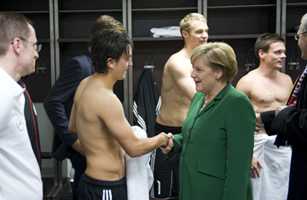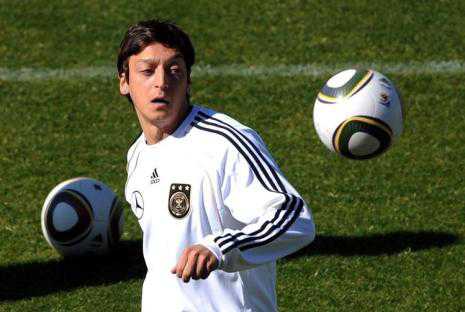By Henning Hoff / Berlin Thursday, Nov. 03, 2011

German Chancellor Angela Merkel congratulates German midfielder Mesut Özil in the dressing room after the Euro 2012 soccer game in Berlin between Germany and Turkey
Guido Bergmann / AFP / Getty Images
It was a memorable game. On Oct. 8, 2010, the national soccer teams of Germany and Turkey met in front of a full-capacity crowd of 75,000 at Berlin’s Olympic Stadium. The fans who had flown in from Turkey, together with some of Berlin’s sizable Turkish community, turned it into something of an away game for the German side, but this wasn’t the evening’s biggest surprise. It was the name of the man of the match: Mesut Özil. Initially greeted by deafening hisses, the unassuming 22-year-old forward, also of the Spanish überclub Real Madrid, was the star of the night. His cool goal 10 minutes from the final whistle secured victory for his team: Germany.
Born to Turkish immigrant parents in Gelsenkirchen — in Germany’s former industrial heartland along the rivers Rhein and Ruhr — Super-Özil, as some papers call him, is the first celebrity player of Turkish descent on a team that has been Germany’s premier outlet for national pride ever since die Mannschaft first won the World Cup in 1954. Özil is the most visible sign that something has changed recently in the story of Turkish immigration to Germany. And as German Chancellor Angela Merkel and Turkish Prime Minister Recep Tayyip Erdogan on Nov. 2 commemorated 50 years since the signing of the recruitment treaty that planted the seed of that community, Germany was forced to face the fact that the story has been, by and large, a rather sorry one. (See a brief history of the World Cup.)
Özil is something of a poster boy for modern Germany — or at least how the country likes to see itself today. After the player’s virtuoso performance at the match against Turkey, Merkel was pictured congratulating a bare-chested Özil in the changing room. The image was a fleeting distraction from the fact that a member of the far-right National Democratic Party had earlier dismissed Özil as a “plastic German” (a reference to the identity card carried by German nationals) and that the game had taken place against the background of a national debate about the hugely popular anti-immigration book Germany Abolishes Itself by Thilo Sarrazin, a former member of the board of Germany’s Bundesbank. In a country of 81 million, the approximately 3 million Turkish nationals or Germans with Turkish roots make up Germany’s largest minority — and often attract the most resentment.
Signed on Oct. 30, 1961, the recruitment treaty allowed booming German industry to bring in Turkish workers to give the labor force a much needed boost. Recent research has shown, contrary to popular belief, that the initiative for the treaty came from Turkey rather than Germany, which agreed, with a little prodding from the U.S., mostly for foreign policy reasons. In Istanbul on Oct. 30, dozens of those early migrants and their relatives boarded a special train to commemorate the original migrants’ first three-day journey to Munich in 1961. “It wasn’t easy for Germany to become Europe’s strongest economy after the war. Our workers played a big part in that,” said Cemil Cicek, head of the Turkish parliament, at the historic Sirkeci station. The workers were recruited by German labor officials from across Turkey, many from tiny villages. Hardly any of them spoke German or anticipated staying longer than their contracts stipulated. Until there was a comprehensive stop announced in 1973, about 750,000 Turkish people, mostly men, went to work in Germany as “guest workers,” as they were called until recently. (Now Germans prefer to speak of those with “a migration background.”) About half of them stayed. (See how Merkel walked a tightrope on German immigration.)
The Turks were relative latecomers; Germany had signed similar agreements with Italy in 1955 and Greece in 1960. But Turkish immigrants often did the dirtiest jobs while remaining invisible to society at large. It took the undercover journalist Günter Wallraff, who exposed the exploitation of Turkish workers in the mid-1980s, to draw attention to their often precarious lives in Germany. Turkish immigrants and their descendants still come last in terms of literacy, education, living standards and employment.
There have been some recent improvements. In 2000, Germany changed its rigid citizen laws and made naturalization easier. Also, attitudes have started to change. The Greens, Germany’s third largest political party, are led by Cem Özdemir, who became the first lawmaker of Turkish descent in Germany’s Parliament in 1994 and was elected joint chair of his party in 2008 (with his supporters chanting: “Yes We Cem!”). In her latest weekly Web-video message, Merkel praised the contribution of Turkish immigrants to Germany’s economic success. “They have become part of our country,” the Chancellor said. Indeed, there are entrepreneurs like Vural Öger, whose Hamburg-based Öger Tours business was bought by Thomas Cook in 2010; prizewinning film directors like Fatih Akin (Against the Wall); actors like Mehmet Kurtulus, whose appearances as an undercover detective in the highly successful Tatort TV crime series were a hit with audiences and critics alike; and writers like Feridun Zaimoglu.
Overall, Deutschtürken are more visible today, but there is still a long way to go before Turkish immigration to Germany can be considered a success story. After decades of closing their eyes to reality and insisting mantra-like that Germany was “no country of immigration,” the country’s leaders in the ’90s declared themselves shocked by the existence of “parallel societies” in Germany and began to demand that Turks integrate. (See pictures of immigration in Europe.)
Turkey’s recent rise on the global stage is mixing things up. With an annual growth rate of 9% last year and a foreign policy that is turning gradually away from Europe and toward the Arab world, a self-confident Turkey changes the terms of the deal. Some leading Turkish politicians have warned Turkish immigrants and their descendants against assimilation, saying they should learn the Turkish language before learning German. Erdogan, speaking to the German tabloid Bild on Nov. 2, criticized Germany for not acknowledging the Turkish contribution enough, noting, among other things, that 72,000 Turkish entrepreneurs in Germany had created 300,000 jobs. He also demanded stronger German support for Turkey’s bid to join the E.U. — anathema to Merkel and her Christian Democratic Union party, which prefers to offer Turkey a “privileged partnership” instead. “It would give integration a boost,” Erdogan argued with some justification. How it would change the face of the national soccer team, though, would remain to be seen.
— With reporting by Pelin Turgut / Istanbul
Read more:
